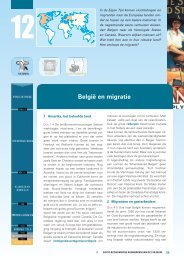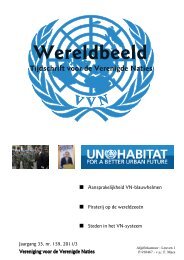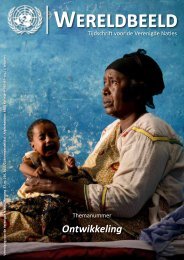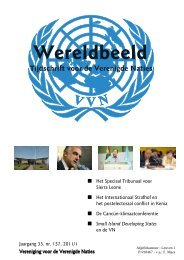Annex 5: United Nations Security Council Resolution 1874 (2009)
Annex 5: United Nations Security Council Resolution 1874 (2009)
Annex 5: United Nations Security Council Resolution 1874 (2009)
Create successful ePaper yourself
Turn your PDF publications into a flip-book with our unique Google optimized e-Paper software.
On Sunday June 25 th, 1950, Kim Il-sung launches a massive invasion of South Korea. Almost<br />
all analysts in the US thought it had been Stalin who had told Kim Il-sung to conquer South<br />
Korea. Today we know that it was the other way around; Kim Il-sung had asked Stalin.<br />
Initially Stalin was against, but forces Kim Il-sung to ask for Chinese approval from Mao. In<br />
January 1950, the Soviet Union conducted an ‘empty chair-policy’ to protest against the fact<br />
that Communist China was not admitted to the <strong>United</strong> <strong>Nations</strong>. For the Americans, this<br />
proved to be a unique occasion to pass a resolution in the UN <strong>Security</strong> <strong>Council</strong>, voted on 27<br />
June 1950, which stated that North Korea should withdraw, and that all members of the<br />
<strong>United</strong> <strong>Nations</strong> should try to offer assistance to South Korea against the invasion. On July 4 th,<br />
1950, the UN <strong>Security</strong> <strong>Council</strong> installed an Expeditionary Force to fight against the DPRK.<br />
The bulk of the force consisted of American troops, but also military forces from sixteen<br />
more countries were part of it (the UK, France, the Benelux-countries, etc.). In August 1950,<br />
the Soviet Ambassador returned to the UN in New York, but the decisions had already been<br />
made. In September 1950, the DPRK had almost completely conquered the south, but on 15<br />
September 1950 the American General MacArthur landed hundreds of miles behind enemy<br />
lines and freed the South Korean capital of Seoul. On October 7 th, 1950, the UK proposed a<br />
text to the General Assembly that later would become known as the “Uniting For Peace-<br />
<strong>Resolution</strong>” or <strong>United</strong> <strong>Nations</strong> General Assembly (UNGA) resolution 377 A. It states that in<br />
cases where the <strong>United</strong> <strong>Nations</strong> <strong>Security</strong> <strong>Council</strong> fails to act in order to maintain<br />
international peace and security, owing to disagreement between its five permanent<br />
members, the matter shall be addressed immediately by the General Assembly. 3 MacArthur<br />
was given clearance to cross the 38 th parallel and “free the whole of the Korean peninsula”.<br />
On October 1950, Mao started a counter-offensive, and conquered Seoul again in December<br />
1950. MacArthur then responded, and re-conquered Seoul in March 1951. The fierce fighting<br />
would drag on until July 26 th, 1953 (Vanden Berghe, 2008: 164-169). When the cease fire is<br />
signed, North Korea has gained nothing. The border at the 38 th parallel is restored, the<br />
economy lies in ruins, and many people had died (1.4 million North Koreans and Chinese,<br />
400.000 South Koreans, 37.000 Americans, the Soviet Union suffered almost no casualties).<br />
Because Stalin had not helped the DPRK, Kim Il-sung distrusted the Russians, and felt<br />
deeply betrayed. After the war, Kim Il-sung therefore switched away from orthodox Marxistcommunism<br />
to his own self-scripted doctrine of "Juche", which essentially calls for selfsufficiency<br />
in all aspects of life. His policies saw North Korea become even more isolated from<br />
and hostile to Western powers. International trade declined and Kim began to perpetuate a<br />
personality cult, styling himself as the "Great Leader". The regime began to strictly control<br />
every aspect of daily life. Although vast military expenditure continued to drain the<br />
economy, North Korea enjoyed a period of relative prosperity through the 1960s and 70s. In<br />
the 1980s however, the country began to falter. While other communist countries attempted<br />
economic reform, North Korea stuck rigidly to the ideological purity of its state-run system.<br />
The collapse of communism in Europe and Russia saw North Korea lose many of the few<br />
trading partners it had. By the mid 1990s, a series of droughts and floods coupled with<br />
continued economic mismanagement triggered severe food shortages. Thousands of<br />
refugees flooded across the border into China.<br />
3 The Uniting for Peace resolution—also known as the "Acheson Plan"—was adopted 3 November 1950 by a<br />
vote of 52 to 5 (Czechoslovakia, Poland, Ukrainian Soviet Socialist Republic, the USSR, Byelorussian Soviet<br />
Socialist Republic), with 2 abstentions (India and Argentina): "Reaffirming the importance of the exercise by the<br />
<strong>Security</strong> <strong>Council</strong> of its primary responsibility for the maintenance of international peace and security, and the duty of<br />
the permanent members to seek unanimity and to exercise restraint in the use of the veto," [...] "Recognizing in<br />
particular that such failure does not deprive the General Assembly of its rights or relieve it of its responsibilities under<br />
the Charter in regard to the maintenance of international peace and security," [...] "Resolves that if the <strong>Security</strong><br />
<strong>Council</strong>, because of lack of unanimity of the permanent members, fails to exercise its primary responsibility for the<br />
maintenance of international peace and security in any case where there appears to be a threat to the peace, breach of<br />
the peace, or act of aggression, the General Assembly shall consider the matter immediately with a view to making<br />
appropriate recommendations to Members for collective measures, including in the case of a breach of the peace or act<br />
of aggression the use of armed force when necessary, to maintain or restore international peace and security."<br />
© <strong>2009</strong> – Dr. D. Criekemans – Negotiations in UNSC on the continuing security provocations by North Korea 9







